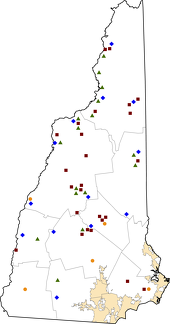New Hampshire
State Office of Rural Health
New Hampshire Rural Health & Primary Care
Phone: 603.271.4412
view details
New Hampshire Nonmetro Population
New Hampshire Rural Healthcare Facilities
Selected Social Determinants of Health for Rural New Hampshire
4.5% of New Hampshire residents lack health insurance (Kaiser, 2022). According to the USDA Economic Research Service (ERS), the average per capita income for New Hampshire residents in 2021 was $73,200, with the rural per capita income at $68,125. Based on 2021 American Community Survey (ACS) data, the ERS reports that the poverty rate in rural New Hampshire is 8.9%, compared with 6.5% in urban areas of the state. 7.0% of the rural population has not completed high school, while 6.0% of the urban population lacks a high school diploma (ERS report using 2017-2021 ACS data). The unemployment rate of rural areas in New Hampshire is 2.5%, and the rate in urban areas is 2.5% (USDA-ERS, 2022).
Data Sources
Kaiser Family
Foundation State Health Facts;
USDA Economic Research Service: State Fact Sheets
Contacts
There are more organizations related to New Hampshire in the organizations section.
Last Reviewed: 6/30/2023


